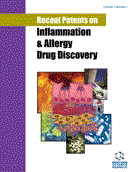Abstract
Background: Heat shock proteins (HSPs) are highly conserved proteins present in all kingdoms of organisms. These are expressed under stress conditions in order to protect the cells from injuries. The stress induced protein denaturation is rectified by refolding and remodelling. These are intracellular proteins but can be present in extracellular fluid like serum of the patients suffering from trauma, autoimmune and inflammatory disorders. Virtually in most inflammatory diseases, immune response towards HSPs is developed.
Objective: The present review expedites the role of HSPs in inflammatory process and associated disorders, mainly in context to HSP70 and HSP90. Method: Commencing a thorough survey of the literature and patents available on HSPs and their role in the process of inflammation, from the authentic published resources available on Medline, Pubmed, Pubmed Central, Science Direct and other scientific databases; the information retrieved has been compiled and analyzed. Results: HSPs modulate the process of inflammation by producing anti-inflammatory cytokines in chronic inflammatory disease. HSPs mediated expression of IL10 contributes in anti-inflammatory role via TLR2 and TLR4-dependent mechanisms. Necroptosis, a caspase independent programmed apoptosis plays an important role in progression of several inflammatory disorders and its major components MLKL and RIPK-1 are the clients of HSP. Necroptosis is also involved in exposure of several damageassociated molecular patterns (DAMPs) including HSPs in extracellular environment leading to inflammation. Endocytosed or intracellular HSP70, is presented by MHC-II molecules and in absence of proper co stimulation, it lead to expansion of tolerogenic or regulatory T cells (Tregs) responses, which have inflammation suppressive activity by virtue of production of anti-inflammatory cytokines, suppression or killing of effector T cells or bringing the APC into tolerogenic state. HSP induced Tregs play an important role in combating autoimmunity and inflammation. Conclusion: Present review gives an insight towards the cause of inflammation and an account of different HSPs contributing various inflammatory disorders viz. inflammatory bowel disease (IBD), intestinal inflammation, atherosclerosis, rheumatoid arthritis (RA), multiple sclerosis etc. The importance of HSPs in handling inflammatory disorders has been depicted in recent patents also.Keywords: Heat shock proteins (HSPs), inflammation, IL-10, molecular chaperon, necroptosis, NF-κB pathway, Tregs, TLR.
 157
157 12
12 1
1 2
2


















